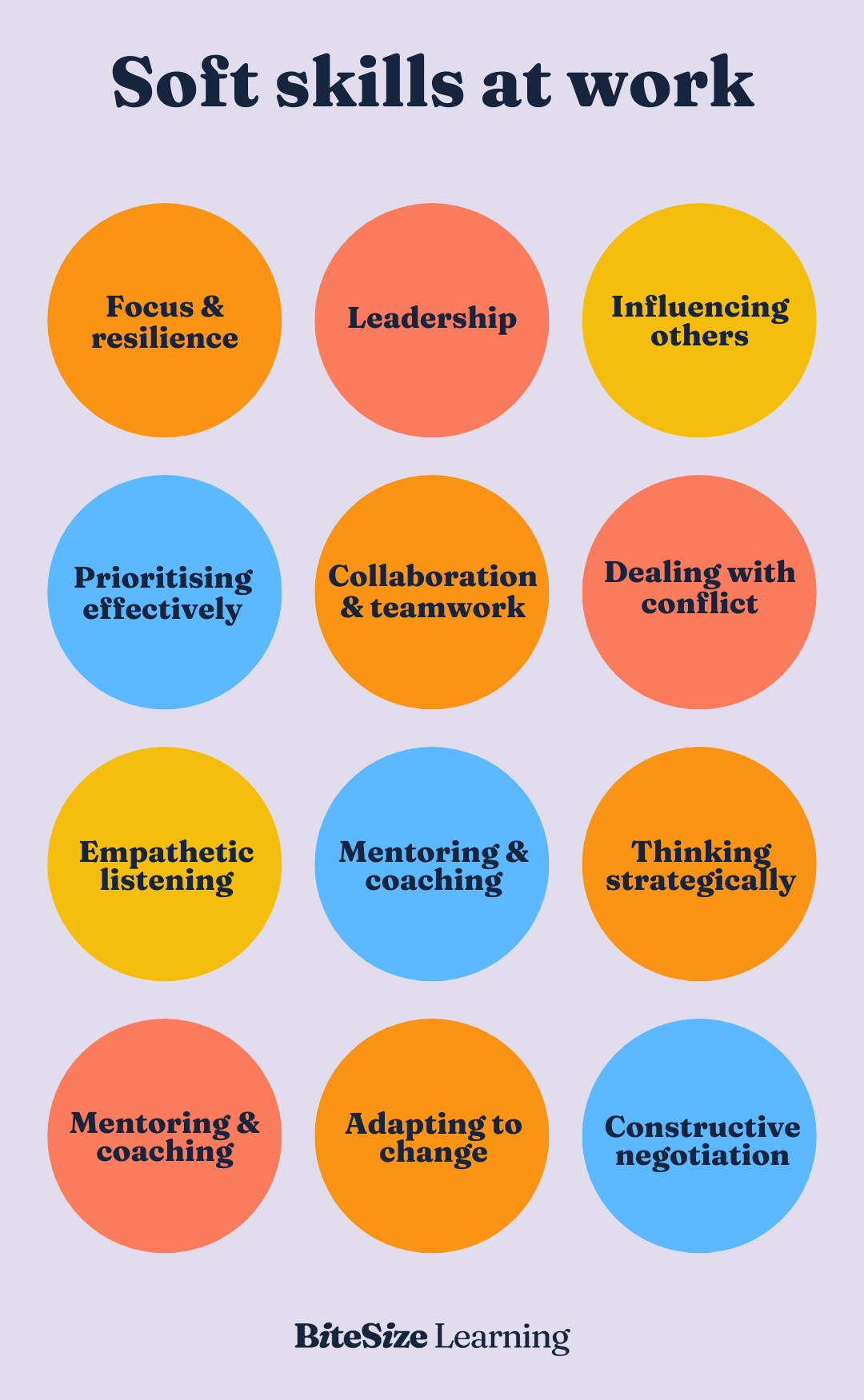What are soft skills, and how can they be trained?
Soft skills might not be ‘hard’, but that doesn’t mean they’re easy! In this article, we’ll define the meaning of soft skills, the difference between hard skills and soft skills, and how a soft skills training provider can develop these crucial abilities across an organisation.
Hard skills vs. soft skills
What’s the difference between hard skills and soft skills? ‘Hard skills’ are the specific technical knowledge and training required for a job, while soft skills are more about how you think and work. They're the intangible qualities that enable you to engage with others and navigate the complexities of the workplace effectively.
For instance, freelance accountants and a web developers will use a very different set of hard skills, but they will benefit from an overlapping set of soft skills: such as building warm client relationships, explaining complex topics in an easy-to-understand way, and taking an organised approach to their work.
Soft skills examples
Soft skills are defined the cognitive approaches, communication abilities and social repertoire that help you work well with others, solve problems, and manage your responsibilities effectively. Some key examples of soft skills include:
Communication - being able to express your ideas clearly and listen attentively
Teamwork - collaborating productively with colleagues
Adaptability - staying flexible and adjusting to change
Problem-solving - analyzing issues and finding effective solutions
Work ethic - being dependable, disciplined, and eager to learn
Interpersonal skills - connecting with others and building relationships
Time management - using your time efficiently and meeting deadlines
Leadership - motivating teams and guiding them to success
This table gives some more examples of how hard skills and soft skills in the workplace might apply to different roles:
| Job | Hard Skill | Soft Skill |
|---|---|---|
| Software Engineer | Programming languages (Java, Python, etc.) | Mentoring junior programmers, communicating issues clearly to non-technical colleagues |
| Nurse | Moving patients safely, providing medication | Bedside manner, dealing calmly with distressed people |
| Graphic designer | Using tools like Photoshop, principles of layout and composition | Gathering useful feedback from clients, presenting work persuasively |
| Marketing Manager | Data analysis and SEO | Dealing with ambiguous information, prioritising effort effectively |
| Research scientist | HPLC, mass spectrometry, flow cytometry | Collaborating with others, negotiating between different research priorities |
| Professional footballer | Outpacing opposition defenders, free kick accuracy, set-piece tactics | Mental resilience, staying calm under pressure, managing effort throughout the game |
The importance of soft skills
In our increasingly collaborative, fast-changing and customer-focused work environments, soft skills have taken on heightened importance in recent years. Here's why:
Teams are the norm. Most work gets done in teams, so being able to contribute to and lead teams effectively is essential. Soft skills like communication, collaboration, and conflict resolution allow you to work more harmoniously and productively with your colleagues.
Change is a constant. Technology, business models, and customer needs are evolving at a dizzying pace. Being adaptable, thinking innovatively, and developing creative solutions are must-have skills to keep up with the speed of change.
Delivering a great customer experience is key. Customers expect a seamless, personalized experience at every touchpoint. Soft skills like active listening, empathy and relationship building help you communicate better with customers and provide top-notch service.
Future-proofing your career. As automation and AI take over more routine tasks, uniquely "human" skills like critical thinking, emotional intelligence and creativity will be increasingly valued. Developing your soft skills ensures you have the tools to adapt and remain relevant over the long run.
Leadership requires strong interpersonal skills. Effective leaders and managers need to build trust, motivate different personalities, make tough decisions, and guide teams through challenges. Honing skills like empathy, influence and mentoring equips you to step into leadership roles.
Developing soft skills through training
As an HR or Learning & Development professional, you know that your organization's success depends on the capabilities of your people. And although some people assume that personal qualities like assertiveness, collaboration and creativity are simply built-in ‘traits’, they are in fact real skills that can be taught and meaningfully developed.
So while training for job-specific technical skills is essential, forward-thinking companies are increasingly recognizing the importance of also developing their employees by working with a soft skills training provider.
After all, these are the skills that enable your talent to work effectively together, adapt to change, and deliver exceptional performance and customer experiences. From leadership and collaboration to emotional intelligence and creativity, these are the skills that will give your organization a competitive edge in an era of fast-paced change.
Improve productivity, innovation and problem-solving. Teams that communicate and collaborate well are more efficient, creative and adaptable. Soft skills training gives your employees a common toolset for working together optimally. You can…
Enhance employee engagement and retention. Investing in soft skills development shows your commitment to your employees' long-term career growth. This can boost motivation, loyalty and engagement.
Identify and develop leaders for succession. Targeted training can help you cultivate the communication, influence and people skills needed for leadership roles. This supports succession planning and helps you build bench strength.
Elevate customer experiences. In an experience-driven marketplace, the empathy, active listening and relationship-building skills of your front-line talent have direct impact on customer satisfaction and loyalty.
Future-proof your organization. As AI and automation transform the workplace, uniquely human skills will be your talent's competitive advantage. By uplevelling their soft skills, you equip them to create value as the nature of work evolves.
Better yet, because soft skills are not tied to particular job functions, soft skills training can be of value to a wide audience of learners across your organisation, developing abilities across departments and up-and-down your org chart.
Meet the UK’s soft skills training provider
BiteSize Learning provides over 70 unique training courses for employees at your workplace, in the skills they need to thrive at work.



